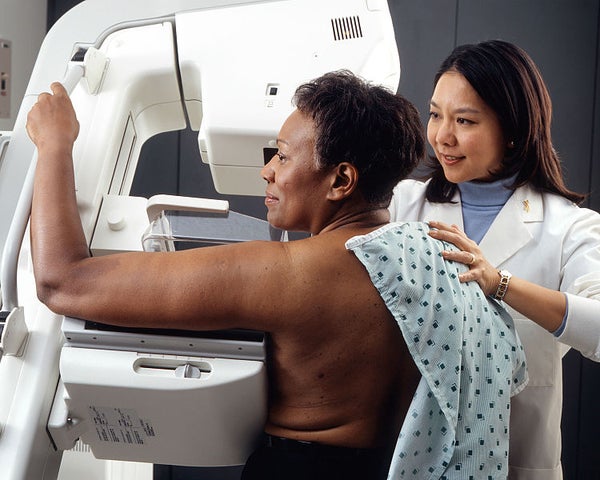This article was published in Scientific American’s former blog network and reflects the views of the author, not necessarily those of Scientific American
After decades of being told that mammograms save lives by detecting breast cancer early, women are now learning that these tests often lead to false alarms, more technically known as “overdiagnosis.” Studies have suggested that for every life mammograms save, as many as ten women receive unnecessary treatment.
Many women apparently accept these odds, because they see the tradeoff as death versus trauma. The fear of dying of cancer outweighs the fear of undergoing what might be unnecessary surgery, chemotherapy and radiation. But what if the unnecessary treatments are not just traumatic but potentially lethal?
This disturbing possibility was raised in “Harms from breast cancer screening outweigh benefits if death caused by treatment is included,” published in 2013 in the The BMJ (British Medical Journal). Labeled a “personal view,” the paper is by Michael Baum, professor emeritus of surgery, Division of Surgery and Interventional Science, University College London.
On supporting science journalism
If you're enjoying this article, consider supporting our award-winning journalism by subscribing. By purchasing a subscription you are helping to ensure the future of impactful stories about the discoveries and ideas shaping our world today.
Baum helped set up breast-cancer screening programs for Britain’s National Health Service more than two decades ago. Since then, he has concluded that screening programs cause more harm than good and “should be scrapped,” as he put it in 2011.
That same year Baum told BBC Radio, "I have watched with increasing alarm as evidence has accumulated that suggests the initial estimates of benefit were exaggerated and the initial estimate of harm was, frankly, ignored. What has gone wrong is that we would never have predicted how many of these cancers detected at screening lack the potential to threaten the woman's life.”
In his 2013 BMJ essay, Baum attempts to estimate the harm of unnecessary treatment for breast cancer. He notes that radiation therapy, for example, increases women’s risk of lung cancer and heart failure. “I crudely estimate,” he writes, “that an addition of 1 to 3 deaths might be expected from other causes for every breast cancer death avoided."
Baum’s position has not changed. In September, he argued in the Journal of the Royal Society of Medicine that “the global breast cancer screening programme has to be considered a ‘failed experiment.’” He told me by email that he is co-writing a paper on “deaths from road traffic accidents relating to the distance women drive for 6 weeks of postoperative radiotherapy. Rare events yes, but breast cancer deaths avoided by screening are also rare events.”
I learned about Baum’s views in “What If Everything Your Doctor Told You About Breast Cancer Was Wrong?” The article, by journalist Christie Aschwanden, was just published in Mother Jones. Every woman—and man--concerned about breast cancer should read it.
Aschwanden concludes: “After nearly 15 years of reporting on mammography, I've reached my fourth decade of life and made my own decision—I'm opting out of the screenings all together. The National Cancer Institute's assessment tool shows that I'm at average risk for breast cancer, so I'd rather take the small chance that I'm missing an opportunity to avert a cancer death than face the larger risk that my life would be turned upside down by an unnecessary diagnosis.”
If Michael Baum is right, mammograms might not just turn your life upside down. They might cut it short.
Further Reading:
“Consumers Must Stop Insisting on Mammograms and Other Ineffective Cancer Tests.”
"ABC Reporter, National Football League Promote Mammograms While Experts Question Benefits."
"Celebrities Should Inform Women about Risks as Well as Benefits of Mammograms."
"Why I Won't Get a Colonoscopy."
"Cancer Establishment Admits We’re Getting Overtested and Overtreated."
